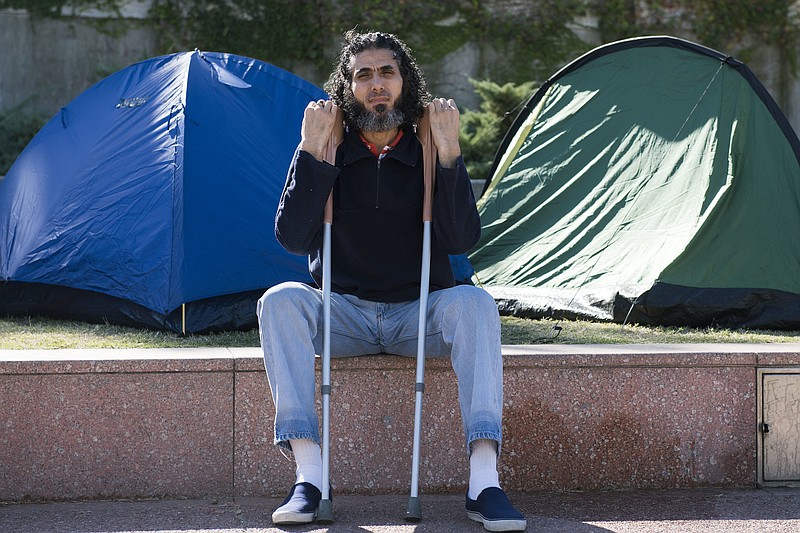MONTEVIDEO, Uruguay (AP) - Uruguay's government said Wednesday that it is searching for another country to take a former Guantanamo detainee who is threatening to die on a hunger strike if he is not allowed to reunite with his family abroad.
Syrian native Abu Wa'el Dhiab has repeatedly said he is unhappy in Uruguay and is demanding he be allowed to leave the South American country, which took him in with five other former Guantanamo prisoners in 2014.
"For several days now, the Uruguayan government has been making arrangements with different states, especially in the Arab world, so they can take in Dhiab and he can fulfill his wish and reunite with his family," Dhiab's government liaison, Christian Mirza, told local radio Sarandi.
"The government is trying its best, but it's not that simple."
Although there's nothing impeding Dhiab's family from coming to Uruguay, the former prisoner is against it, Mirza said. "We'd have to ask ourselves why his family could not come to Uruguay when the families of other Guantanamo refugees came here when they wished."
Dhiab was briefly hospitalized Monday night in Montevideo after he became weak from the hunger strike and was released Tuesday. Late on Tuesday, friends posted a YouTube video showing Dhiab lying on a mattress in his apartment next to a copy of a newspaper. He speaks softly in Arabic pressing his demand to be sent to another country to be with his family.
"My decision to go on a hunger strike is my final decision. Either in Argentina or Afghanistan (or wherever) with my family or I die," he says "My daughter will marry in 10 days. I would have liked to be with you."
Dhiab also says that he feels like a prisoner in Uruguay. "They tell me I'm free, but that is not true," he says, vowing to keep up the strike to the death if he must.
Dhiab insists that he has been on a 25-day hunger strike and has not consumed any liquids for five days. But some of his friends and Foreign Minister Rodolfo Nin Novoa have said he ate some food last week on a flight from Venezuela to Uruguay. In the video posted online, Dhiab accuses the United States of locking him up for 13 years and subjecting him to torture. A crowdfunding effort launched to support Dhiab's reunion with his family had so far raised $260 online.
Dhiab was at the center of a legal battle at Guantanamo for years because of repeated hunger strikes to protest indefinite detainment and he suffers from health problems related to the hunger strikes and forced feedings while in U.S. custody.
Earlier this year, he went missing from Uruguay for weeks, alarming officials in neighboring countries and setting off recriminations from U.S. lawmakers who scolded the Obama administration for losing track of him.
Dhiab resurfaced late July in Venezuela, where he was held in isolation before being deported to Montevideo last week. The Uruguayan Foreign Ministry has said he tried to get help to reunite with his family in Turkey or another country. Since returning to Montevideo, Dhiab has grown frustrated with a government-appointed non-governmental organization that he says owes him three months of aid, said Dhiab's friend Jorge Voituret.
Dhiab and the other former prisoners came to Uruguay at the invitation of then-President Jose Mujica. They were detained in 2002 for suspected ties to al-Qaida and held without charge like hundreds of others at Guantanamo before U.S. officials cleared them for release.
Uruguay has provided social services and financial support, but the men have struggled to adjust and say they don't get enough help. Dhiab has been the most vocal member of the group.
Shortly after arriving in 2014, he called a news conference to complain that the government needed a better resettlement plan. Last year he visited neighboring Argentina and told reporters he planned to seek asylum.
___
Associated Press writer Peter Prengaman in Rio de Janeiro, Brazil contributed to this report.
